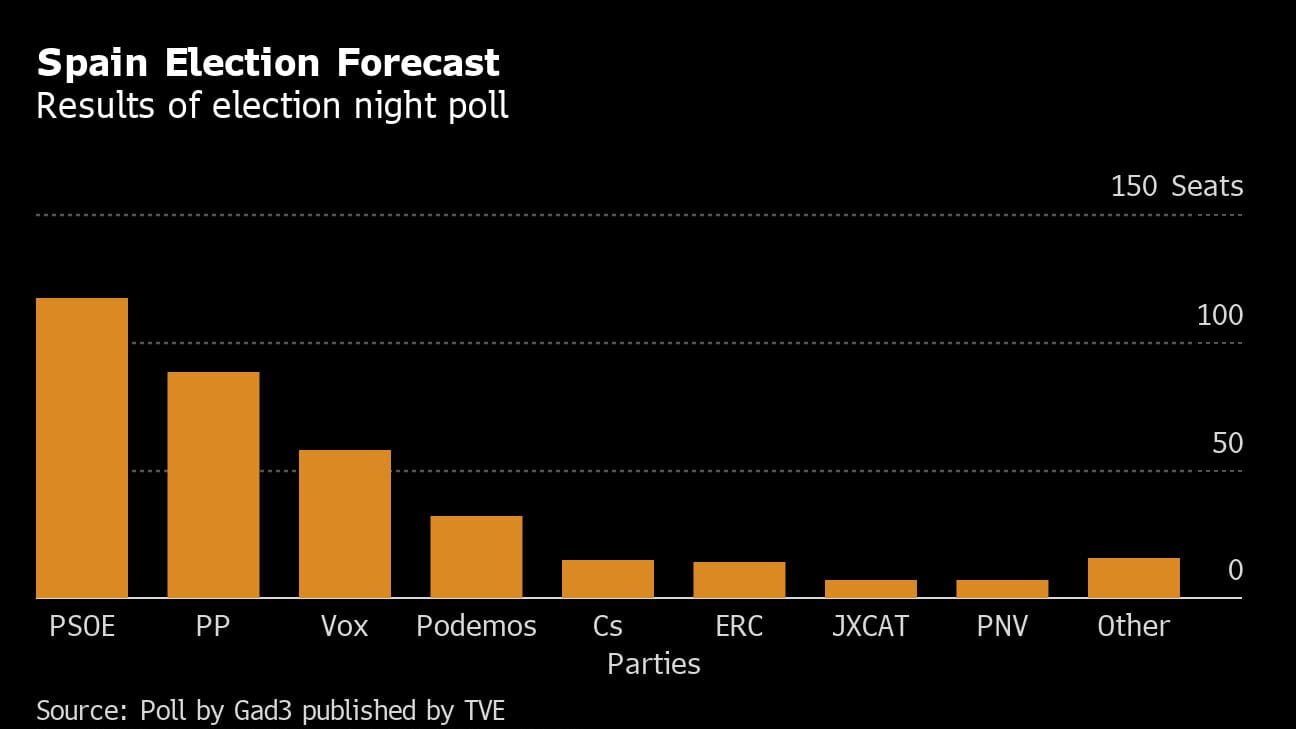
(Bloomberg) -- Spaniards have voted on Sunday for the second time this year as the country strives to break a political logjam. The first poll after voting closed points to Prime Minister Pedro Sanchez’s Socialists falling short of an outright majority and the far-right Vox party gaining seats.
At this rate, the impasse looks set to go on.
Key Developments:
- Poll shows Sanchez getting most seats but lacking outright majority
- Whatever party can form a coalition to reach 176 seats needed to form a majority in the 350-seat lower chamber is going to govern.
Sanchez Is in the Same Bind as Before (8:37 p.m.)
The poll suggests that Sanchez didn’t get the boost that he was hoping for when he took the risky decision to repeat elections. In fact, holding the vote in the aftermath of the conviction of Catalan separatists and the exhumation of General Franco drove support toward the Spanish nationalists of Vox.
The opposition’s numbers also don’t add up (8:30 p.m.)
The three right-wing parties -- the People’s, Ciudadanos and Vox -- are projected to win up to 164 seats. But their chances of persuading other groups to help them over the line is practically zero. So if the poll is right, Sanchez is really the only person who has a chance of forming a government. The question is how on earth can he do it?
First Poll After Voting Closes Points to Status Quo (8:16 p.m.)
Quick snap shot of the first opinion poll after voting closed is below:
- Socialists With About 114-119 Seats
- People’s Party With About 85-90 Seats
- Vox Party With About 56-59 Seats
It looks likely to be a hollow victory for Sanchez’s Socialists. They will emerge as the largest party but will have lost ground to the right. It’s a solid result for the PP, which looks to have clawed back some of the seats it lost in April. The big winner looks likely to be Vox, which will become the third-biggest party. That’s a huge change given that six months ago it didn’t even have a presence in parliament.
Look out for Vox (8:01 p.m.)
One party benefiting from the Catalonian issue is Vox, led by Santiago Abascal, which advocates for the strongest punishment for the secessionists and argues for the dismantling of Spain’s system of autonomous regional government. Its hard line resonates with some Spaniards: Vox entered parliament for the first time in April with 24 seats, and polls suggest it could double that tally.
Read this for a very good explainer on this phenomenon
The issue that won’t go away (7:45 p.m.)
Catalonian separatism has loomed large in Spanish politics ever since the local government’s attempt to force a break from Spain in 2017. The lengthy sentences recently handed to those leaders for sedition and the outbreak of violent protests in response have brought the issue to the fore once more
Sanchez has had a bad week (earlier)
Sanchez had hoped for a trouble-free few days before the election. Instead, he’s found himself defending the health of the economy and dragged further into the morass of the Catalan separatist movement. Calling another round of elections may prove to be an act of hubris, allowing his opponents on the right to gain more seats.
Sanchez’s Bad Week: Data, Errors Mar Spain Leader’s Campaign
To contact the reporters on this story: Charlie Devereux in Madrid at cdevereux3@bloomberg.net;Esteban Duarte in Toronto at eduarterubia@bloomberg.net;Jeannette Neumann in Madrid at jneumann25@bloomberg.net
To contact the editors responsible for this story: Ben Sills at bsills@bloomberg.net;Flavia Krause-Jackson at fjackson@bloomberg.net
For more articles like this, please visit us at bloomberg.com
©2019 Bloomberg L.P.